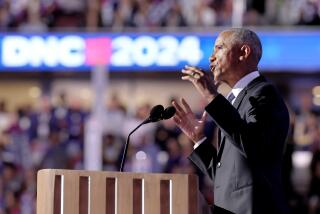Gore Acts to Distance Self From Party Rivals : Tennessee Senator Espouses Tough Defense Stand During Debate With 5 Other Democrats
- Share via
MIAMI — Tennessee Sen. Albert Gore Jr. sought to widen the gap between himself and his five rivals for the Democratic presidential nomination on defense and foreign policy issues in a campaign debate here Monday night.
On questions relating to aid to the contra guerrillas in Nicaragua, the 1983 invasion of Grenada, and the use of the U.S. fleet to escort Kuwaiti tankers in the Persian Gulf, Gore disagreed sharply with one or more of the other candidates. He depicted himself as tougher and in his own words more “realistic” than the others.
His tactics in this debate broadcast by public television here in Florida and five other Southern states were similar to those he pursued in a similar debate on national security issues eight days ago in Des Moines, Iowa. And together they seemed designed to strengthen his appeal in the critical Super Tuesday primary in the South next March. Gore is the only white Southerner in the Democratic race.
Southern voters are believed to be relatively conservative on foreign policy issues and success in that region is considered critical to Gore’s long shot hopes of gaining his party’s nomination.
Gephardt Accusation
So pointed were Gore’s efforts to separate himself from his competitors that Missouri Rep. Richard A. Gephardt accused him of modifying views for the sake of political advantage.
After Gore had stressed that he was the only Democratic contender to support humanitarian or so called “maintenance” aid to the contras, Gephardt contended that Gore had voted against such aid often in the past.
“I know the time has changed but I think the politics have changed too,” Gephardt said. “I don’t think we ought to leave the beliefs that we have stood for for the past five years.”
Gore made a similar charge against Gephardt, accusing him of tailoring his views to suit Southern beliefs.
‘Different’ Statements
“I was wondering going into this debate whether everybody was going to talk the same way here that they talked in Iowa. . . . And some statements here are very different” from those made in Iowa, he said.
Gore made this comment after Gephardt disagreed sharply with former Arizona Gov. Bruce Babbitt’s proposal that the United States move away from its present policy of leaving open the possibility of using nuclear weapons to counter a conventional Soviet attack on Western Europe.
Gore told reporters after the debate that he believed Gephardt had taken a different position in the earlier debate. Gephardt denied this and challenged Gore to review the tape of the debate.
On the subject of U.S. escorts of Kuwaiti tankers, Gore said: “I think we not only have a right to be there, I think we have a self-interest in keeping those sea lanes.” The others have been generally critical of the Reagan Administration policy and have urged that the United States attempt joint action with its allies in the gulf.
Gore also differed bluntly with Massachusetts Gov. Michael S. Dukakis and the Rev. Jesse Jackson on the invasion of Grenada. Jackson called the U.S. action “illegal,” undertaken when our real objective was to curb Cuban influence in the Caribbean.
Dukakis said the invasion would have been legitimate only if it was necessary to protect American lives.
“Rev. Jackson and Gov. Dukakis are just plain wrong,” Gore declared. “The intervention in Grenada was justified.”
When Dukakis insisted that he could not be sure whether the invasion was proper unless he knew whether American lives were in danger, Gore challenged him: “You can’t just say I’m not sure whether I’m going to do it or not. Be decisive.”
“I wasn’t President at the time,” Dukakis shot back. “I hope I will be some day.”
Gore’s rhetoric prompted a rejoinder from the usually mild mannered Illinois Sen. Paul Simon. In his closing statement Simon said that comments made “by one of my colleagues,” an apparent reference to Gore, had indicated that “if we do certain things in foreign policy and defense policy we can get more votes.”
“I think the question cannot be votes,” Simon said. “The question is what is best for America.”
Asked about U.S. relations with South Africa, Gephardt said he could “see a situation” in which the United States might send military aid to rebels against the Pretoria regime just as the United States aids anti-Soviet rebels in Afghanistan.
“It may come to the fact we’re going to have bloodshed in South Africa,” Gephardt said. “In that case I can envision the U.S. helping people fight for their basic freedoms.”
Babbitt suggested that the United States should extend “diplomatic liaison “ to the South African trade union congress and the African National Congress, two dissident forces in the country. This would “send a message” to the South African government, Babbitt said, that the United States did not regard it as “the exclusive voice” of South Africa’s people.
Important Issue
Defense policy and national security has been playing an increasingly important part in the competition for the Democratic nomination for two reasons: The two most recent candidate debates have focused on the issue, and the differences between the candidates on such economic issues as the U.S. trade imbalance and the budget deficit so far have not been very dramatic.
But the trouble for the candidates is that the defense issue cuts in opposite directions in two key battlegrounds, the South and Iowa.
In Iowa, the doves are believed to have the upper hand, at least among the party activists who greatly influence the outcome of the state’s precinct caucuses next February.
In the South, on the other hand, where 14 states including Florida pick about one-third of the national convention delegates next March 8, the hawk is considered to be the bird of choice.
In August, during his one-on-one debate with Gephardt, Dukakis sharply challenged the congressman for several votes on behalf of the MX missile and other weapons systems, a move that seemed intended to strengthen Dukakis among Iowa’s liberals.
Not long afterward, though, Gephardt, while visiting Little Rock, Ark., counterattacked by contending that no Democrat could hope to carry the South, or win the November general election, unless he favored a strong defense.
The most recent and perhaps boldest use of the defense issue prior to Monday night came in the debate eight days ago in Des Moines, when Gore sought to adopt a much tougher stance than the rest of the Democratic contenders, declaring afterward: “It was me against them.”
In campaign terms, Gore seemed to be hoping to pick up whatever defense-oriented Democrats he can in Iowa, but mainly to establish himself in the Southern Super Tuesday states as the only true advocate of a strong military.
Staff writer Keith Love contributed to this story.
More to Read
Get the L.A. Times Politics newsletter
Deeply reported insights into legislation, politics and policy from Sacramento, Washington and beyond. In your inbox twice per week.
You may occasionally receive promotional content from the Los Angeles Times.










